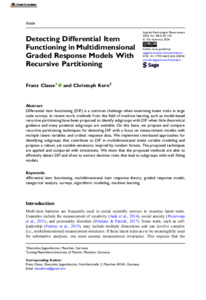|
Detecting differential item functioning in multidimensional graded response models with recursive partitioning
Classe, Franz
;
Kern, Christoph
![[img]](https://madoc.bib.uni-mannheim.de/66893/1.hassmallThumbnailVersion/classe-kern-2024-detecting-differential-item-functioning-in-multidimensional-graded-response-models-with-recursive.pdf)  Vorschau |
|
PDF
classe-kern-2024-detecting-differential-item-functioning-in-multidimensional-graded-response-models-with-recursive.pdf
- Veröffentlichte Version
Download (766kB)
|
|
DOI:
|
https://doi.org/10.1177/01466216241238743
|
|
URL:
|
https://journals.sagepub.com/doi/10.1177/014662162...
|
|
URN:
|
urn:nbn:de:bsz:180-madoc-668938
|
|
Dokumenttyp:
|
Zeitschriftenartikel
|
|
Erscheinungsjahr:
|
2024
|
|
Titel einer Zeitschrift oder einer Reihe:
|
Applied Psychological Measurement
|
|
Band/Volume:
|
48
|
|
Heft/Issue:
|
3
|
|
Seitenbereich:
|
83-103
|
|
Ort der Veröffentlichung:
|
Thousand Oaks, CA
|
|
Verlag:
|
Sage Publications
|
|
ISSN:
|
0146-6216 , 1552-3497
|
|
Sprache der Veröffentlichung:
|
Englisch
|
|
Einrichtung:
|
Außerfakultäre Einrichtungen > MZES - Arbeitsbereich A
|
|
Bereits vorhandene Lizenz:
|
 Creative Commons Namensnennung 4.0 International (CC BY 4.0) Creative Commons Namensnennung 4.0 International (CC BY 4.0)
|
|
Fachgebiet:
|
310 Statistik
|
|
Freie Schlagwörter (Englisch):
|
differential item functioning , multidimensional item response theory , graded response model , categorical analysis , surveys , algorithmic modeling , machine learning
|
|
Abstract:
|
Differential item functioning (DIF) is a common challenge when examining latent traits in large scale surveys. In recent work, methods from the field of machine learning such as model-based recursive partitioning have been proposed to identify subgroups with DIF when little theoretical guidance and many potential subgroups are available. On this basis, we propose and compare recursive partitioning techniques for detecting DIF with a focus on measurement models with multiple latent variables and ordinal response data. We implement tree-based approaches for identifying subgroups that contribute to DIF in multidimensional latent variable modeling and propose a robust, yet scalable extension, inspired by random forests. The proposed techniques are applied and compared with simulations. We show that the proposed methods are able to efficiently detect DIF and allow to extract decision rules that lead to subgroups with well fitting models.
|
 | Dieser Eintrag ist Teil der Universitätsbibliographie. |
 | Das Dokument wird vom Publikationsserver der Universitätsbibliothek Mannheim bereitgestellt. |
 Suche Autoren in Suche Autoren in
Sie haben einen Fehler gefunden? Teilen Sie uns Ihren Korrekturwunsch bitte hier mit: E-Mail
Actions (login required)
 |
Eintrag anzeigen |
|
|
 ORCID: 0000-0001-7363-4299
ORCID: 0000-0001-7363-4299



 Creative Commons Namensnennung 4.0 International (CC BY 4.0)
Creative Commons Namensnennung 4.0 International (CC BY 4.0) Suche Autoren in
Suche Autoren in